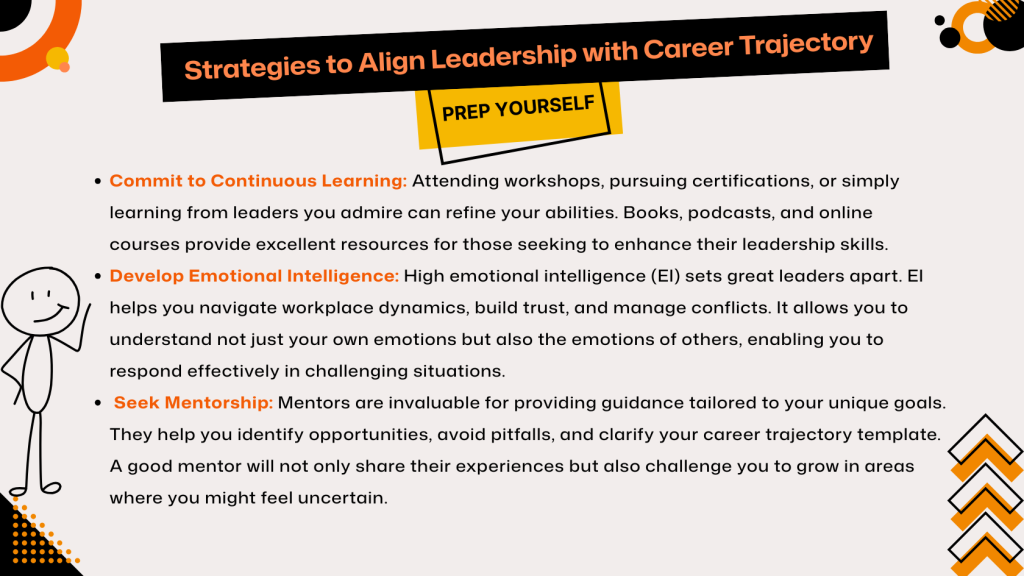You’re working hard, doing everything right, but still feel stuck in your role. You see others climbing the ladder, and you wonder what they’re doing differently. The answer often lies in leadership. Leadership isn’t just about managing others—it’s about taking ownership, fostering growth, and aligning with purpose. More importantly, it sets the tone for how others perceive your potential. If you’re looking to navigate the complexities of your career growth, understanding and cultivating how leadership shapes career trajectories is necessary.
But what does career trajectory really mean?
It’s the path your career takes over time, influenced by the roles you assume, the skills you acquire, and, most importantly, the leadership qualities you cultivate. Whether you’re leading a team, a project, or just yourself, these skills define the arc of your career growth trajectory. They determine how quickly you progress, the quality of opportunities you attract, and the level of fulfilment you achieve in your professional life.
Understanding the Role of Leadership in Career Trajectories
Leadership is like a superpower for shaping your career trajectory. It’s not reserved for those with “manager” in their title. Leadership is about the choices you make and the mindset you carry into every interaction. It’s about being proactive rather than reactive and looking for ways to add value, even in situations where your authority is informal.
Leadership is about taking responsibility for lives and not numbers. Managers look after our numbers and our results and leaders look after us. All managers of metrics have an opportunity to become leaders of people. Just as every doctor in our country learned the importance of sterilizing their instruments, so too must every leader of every organization do the little things necessary to protect their people.
Simon Sinek, Leaders Eat Last
This mindset goes beyond positional authority and taps into the ability to inspire and uplift others—a quality that makes you indispensable in any role.
How Leadership Influences Career Growth

- Skill Development for the Future: Leadership cultivates essential skills like strategic thinking, emotional intelligence, and decision-making. These abilities aren’t just valuable—they’re transformative, creating a solid foundation for your career trajectory. As you develop these skills, you also become better at handling complex problems, making you a go-to resource in your organization.
- Building Networks and Influence: Leaders are collaborators by nature. Building genuine relationships and influencing others paves the way for long-term professional success, propelling the trajectory of your career upward. Networking, for instance, is often undervalued, but it’s one of the most critical tools for leaders to broaden their impact and accelerate their growth.
Strategies to Align Leadership with Career Trajectory
Leadership isn’t just a mindset—it’s a practice. It involves intentional actions that demonstrate your ability to lead and inspire others. Here are some actionable ways to integrate leadership into your career trajectory plan:

Real-World Examples of How Leadership Shapes Career Trajectories
Leadership isn’t just a theoretical concept—it’s a proven catalyst for career growth.
Take Jocko Willink’s insights from Extreme Ownership, where he writes:
“Leaders must own everything in their world. There is no one else to blame.”
This principle of accountability translates directly into professional growth by positioning you as a dependable and proactive force in your organization. Ownership doesn’t just mean taking responsibility for success; it also means owning failures and learning from them.
Another example comes from Multipliers by Liz Wiseman, which illustrates how leaders amplify the talents of those around them.
The best leaders don’t create followers; they create more leaders
Liz Wiseman, Multipliers
This ripple effect not only uplifts others but also cements your role as a transformational leader. Being a multiplier ensures your value extends far beyond individual contributions, impacting entire teams and organizations. This shows how leadership shapes career trajectories.
The Challenges of Leadership Development to Shape Career Trajectories

Let’s not sugarcoat it—developing leadership skills is hard. It involves stepping out of your comfort zone, making mistakes, and embracing vulnerability. Growth requires confronting fears and failures head-on.
When you care personally and challenge directly, you can create an environment where everyone can do their best work and love what they do.
Kim Scott, Radical Candor
This delicate balance requires practice, but the payoff is a career trajectory defined by growth and resilience.
Common Challenges
- Imposter Syndrome: Doubting your abilities can hold you back. Overcoming this starts with acknowledging your wins and seeking feedback. Surround yourself with a supportive network that reminds you of your potential.
- Fear of Failure: Leadership isn’t about perfection; it’s about persistence. Each mistake is a lesson that pushes your career growth trajectory forward. Every leader you admire has faced failures and used them as stepping stones.
The Bigger Picture: Leadership’s Broader Impact
Leadership doesn’t just shape your career—it creates a ripple effect. By inspiring those around you, you contribute to a collaborative and thriving work environment. This alignment with purpose is where leadership truly shines. As Simon Sinek puts it:
“Working hard for something we don’t care about is called stress; working hard for something we love is called passion.”
When your leadership aligns with your values and vision, you create meaning not just for yourself but for those you lead. This purpose-driven approach enhances team dynamics, fosters innovation, and establishes a legacy that transcends individual achievements.
Conclusion
Leadership is the ultimate accelerator for your career trajectory. It’s not about titles or authority—it’s about taking ownership, building relationships, and fostering growth. Whether you’re leading a team, mentoring a colleague, or simply stepping up in your role, every act of leadership adds momentum to your career growth trajectory.
So, where do you start? Begin by embracing the small leadership opportunities around you. Volunteer for a project, mentor a junior colleague, or simply approach your work with ownership and accountability. Remember, leadership isn’t about waiting for the perfect moment—it’s about creating it.
Leadership isn’t just a step in shaping your career trajectory—it’s the foundation for a fulfilling and impactful professional journey. Take that step today and watch your career soar.
